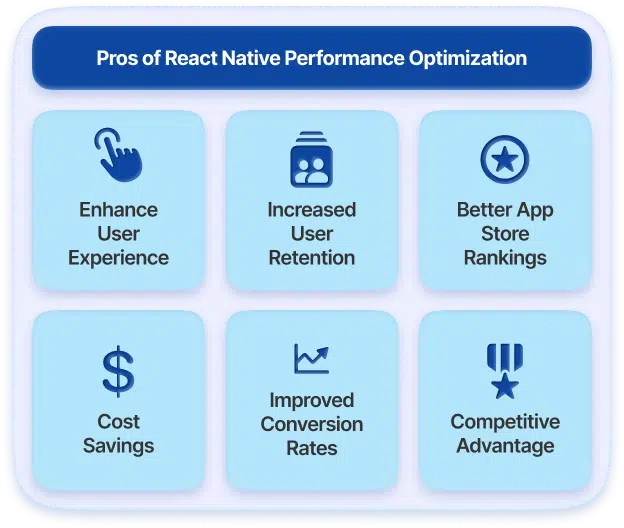- How Does React Native Transform App Development?
- 1. Cross-Platform Compatibility – Write Once, Run Anywhere
- 2. Strong Community and Ecosystem
- 3. Performance Optimization with Native Modules – Combining the Best of Both Worlds
- 4. Hot Reloading for Faster Development – Speedy Iterations with Hot Reload
- 5. Cost-Effective Development – Maximizing Budget Efficiency
- 6. Growing Popularity Among Enterprises
- 7. Simplified Development Process for a Better Experience for Developers
- 8. Staying Ahead with Regular Updates
- 9. Rich Pre-Built Components and UI Libraries
- 10. Strong Backing by Facebook
- Conclusion
React Native is shaping the future of app development with its cross-platform capabilities, strong community, and cost-effective solutions.
App development trends keep changing with the evolution of technology. Previously, developers had to choose between for native development for iOS and Android. Developing these apps presented several challenges.
However, React Native has emerged as the future of mobile app development. Currently, React Native ranks second among the cross-platform mobile frameworks, enjoying a 32% market share.
How Does React Native Transform App Development?
Read on to understand what makes React Native a future proof technology for mobile app development.
1. Cross-Platform Compatibility - Write Once, Run Anywhere
Imagine writing your code just once and using it on both Android and iOS. That’s the power of React Native. It offers impressive cross-platform development features to developers, who use a single codebase to build apps for different platforms.
With this approach, app developers can speed up the process and significantly slash costs. Take the instance of the AirBnb app, which is based on React Native. It delivers consistent performance across multiple platforms, while reducing the time to market.
2. Strong Community and Ecosystem
The React Native developer community is large and active. It consistently contributes to the ecosystem. This provides developers with easy access to a wealth of libraries, tools, and other resources to streamline the development process.
Third-party libraries like React Navigation and Redux have also strengthened React Native apps.
3. Performance Optimization with Native Modules - Combining the Best of Both Worlds
React Native stands out when it comes to performance optimization. Developers integrate React Native modules to fine-tune the performance of apps where it matters most. This implies that while developers can use React Native to build most of the apps, they can use native modules in React Native to optimize parts critical to performance.
For instance, Walmart used React Native in their app to integrate native components. This ensures smooth performance of the app, particularly during high-traffic events like Black Friday.

4. Hot Reloading for Faster Development - Speedy Iterations with Hot Reload
For developers, it’s frustrating to wait for the app to compile every time a change is made. Hot reload in React Native solves this problem. Thus, developers need not restart the app to check the changes in real time. Thus, it significantly speeds up the development process and makes error handling and debugging much more efficient.
The hot reload feature is one of the best React Native advantages. It particularly comes in handy when complex features are developed, and you need quick iterations.
5. Cost-Effective Development - Maximizing Budget Efficiency
As they use a single codebase for cross-platform app development, React Native is the first choice for startups and enterprises.
For instance, Instagram adopted React Native to pacify its development process, keeping costs under control. This makes it a cost-effective mobile development solution in the industry.
6. Growing Popularity Among Enterprises
React Native isn’t simply appealing to startups. Large enterprises have also recognized its potential. Facebook, Instagram, and Airbnb are just a few of the companies adopting React Native. Its scalability and reliability prompt larger companies to join the bandwagon.
No wonder, React Native for enterprises is gaining popularity as they can handle large-scale projects while delivering a consistent user experience across all platforms. With the increasing popularity of React Native, other brands are looking to embrace this technology for app development.
7. Simplified Development Process for a Better Experience for Developers
For developers, React Native is a popular choice since it simplifies the process of development. When you work with React Native, you primarily use JavaScript, which is one of the most extensively used programming languages in the world. This makes it easier for developers to learn and start building the apps quickly.
Moreover, tools like Expo and the React Native CLI further enhance the experience of developers, streamlining the process of development. As a result of this improved workflow, the development cycles become faster and they enjoy a faster time to market.
8. Staying Ahead with Regular Updates
The continuous evolution and updates make React Native the future of mobile app development. React Native is keeping up with the evolving world of technologies, thanks to its strong backing from Facebook and the open-source community. With these regular updates, React Native apps can remain future-proof with the latest features and improvements.
For instance, recent updates focus on improving native performance. This makes React Native even more competitive with fully native development approaches.
9. Rich Pre-Built Components and UI Libraries
When it comes to designing beautiful and responsive user interfaces, developers naturally encounter challenges. Thanks to the rich pre-built components and UI libraries for React Native, developers can speed up the process. Besides, Since React adopts a Declarative UI approach, developers can describe how the UI will look based on its current state.
Whether you are using React Native Elements or NativeBase, these libraries will allow you to create stunning interfaces with minimal effort. Naturally, this pacifies the development process, so that your teams can focus on building a great user experience.
10. Strong Backing by Facebook
When it comes to technology, React Native takes advantage of the strong backing from a major tech player like Facebook. Originally, it was developed by Facebook and currently, this social media giant maintains it. With this strong backing, React Native continues to evolve as a future-proof technology with regular updates and improvements.9.0
Businesses trust React Native knowing that their developers can integrate device specific features. React Native has got a strong backing from Facebook and stands out with its reliability.
Conclusion
React Native is more than a trend, emerging as a powerful and future-proof technology that is likely to dominate the future of app development. With its custom module development and cross platform development features, it stands out as a compelling choice for forward-thinking developers.
Whether you’re an established brand or a startup, your developers can benefit from the strong community support and continuous evolution of React Native. You may want to build a high-performance app with native modules, or simply be looking to curtail development costs. Reach out to established developers as they stay abreast of the latest features in React Native.
Embrace React Native today and stay ahead in the competitive world of mobile app development.


